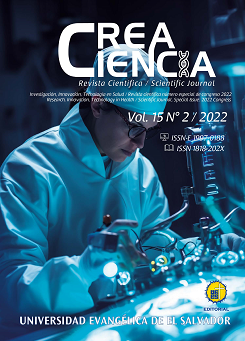Contribution to the SDG sustainable development goals through scientific research.
DOI:
https://doi.org/10.69789/creaciencia.v15i2.655Abstract
Higher Education Institutions (HEIs) make efforts to contribute with research projects to the thematic axes that contain the 17 SDGs. The national monitoring aspects of the SDGs in El Salvador can be corroborated in the data hosted on the regional platform of the 2030 Agenda for Latin America and the Caribbean. Within the framework of these statistics that reflect the condition of El Salvador, in the year 2022 At the international congress held annually by the Evangelical University of El Salvador, the “Contribution to the SDGs” was highlighted, through research that brought together professionals, academics and researchers from various disciplines at the congress with the objective to share knowledge, experiences and advances in scientific research and innovation, with a specific focus on contributing to the Sustainable Development Goals (SDGs) established by the United Nations.
Downloads
144
Downloads
Published
How to Cite
Issue
Section
License

This work is licensed under a Creative Commons Attribution-NonCommercial-ShareAlike 4.0 International License.
© Crea Ciencia
Declaration of originality and assignment of rights
The article must be sent with a declaration of originality, responsibility and assignment of rights of copy of the manuscript, scanned and signed by the author or by one of the authors when the authorship is collective (designated author), stating that the text has not previously published in printed or electronic format, which will not be presented to any other media before knowing the decision of the journal Crea Ciencia and that, if accepted for publication, the authors transfer the copyrights in all forms and media known. At the end of six months of the publication, the text can be shared in another magazine citing the first version of the article published in Crea Ciencia and recording its number and volume. If the article is not published, the UEES agrees to return the rights enunciated to their authors.

Crea Ciencia articles are published in open access and licensed under a Creative Commons Attribution-NonCommercial 4.0 International License.

